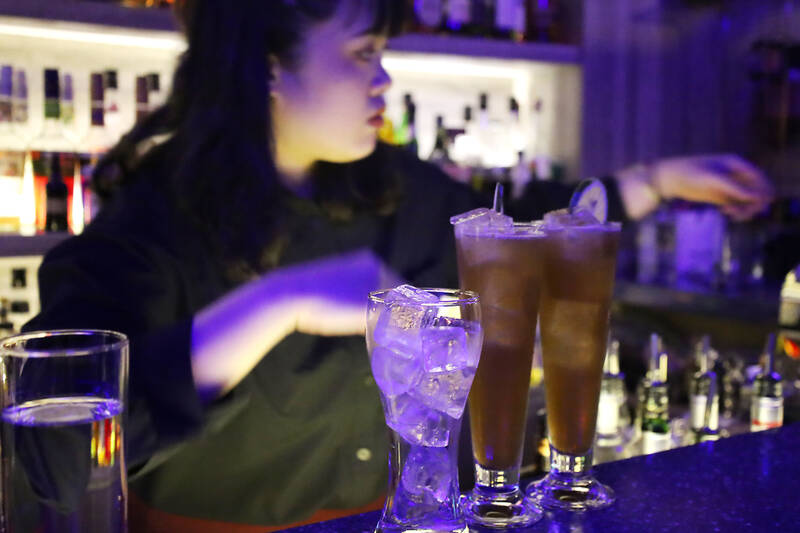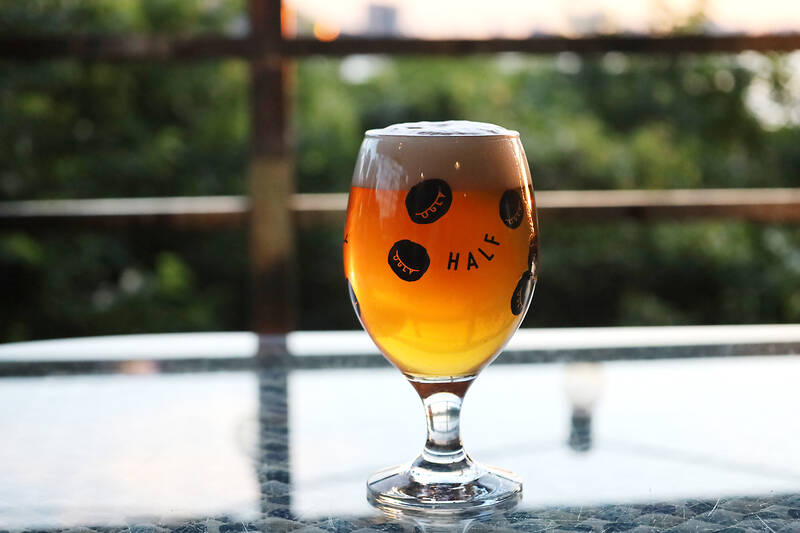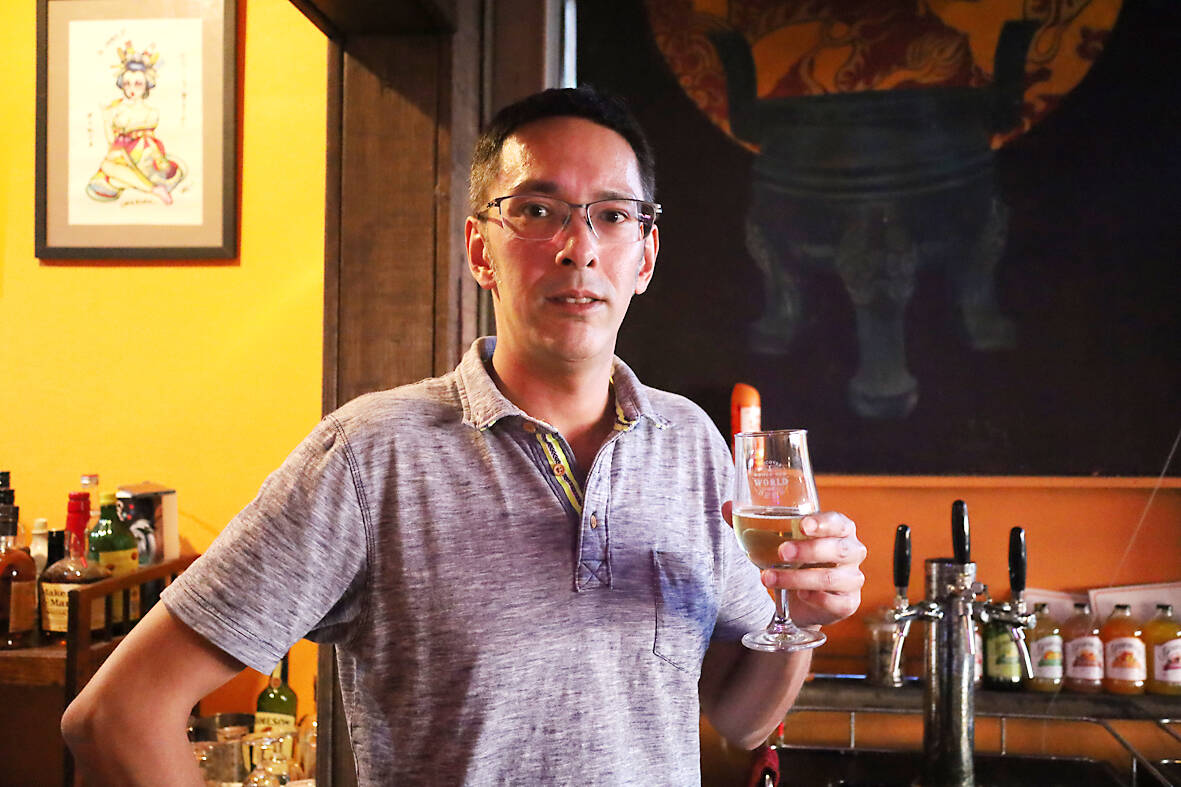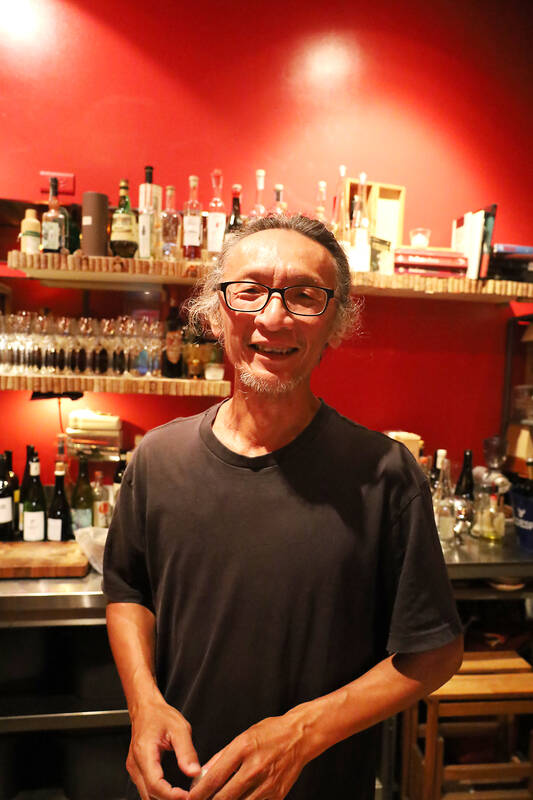Alighting at Danhai New Town (淡海新市真站) in New Taipei City, the penultimate station of the Tamsui (淡水) light rail line, I make my way westwards, passing nondescript apartment blocks until I come within view of the Taiwan Strait.
On reaching the corner of Sinshihwu Road (新市五路) and Houjhou Road (後州路), a young couple carrying a takeaway bottle of white wine pass me en route to Haiweizih Beach (海尾子海灘), a popular spot to watch the sunset.
The bottle was purchased from my first port of call, Bar Qvevri (陶甕自然酒吧), which promises “natural and authentic wines” on its official Instagram account.

Photo: Thomas Bird, Taipei Times
Although the setting is suburban, the bar is anything but. The walls are painted crimson and decorated with a psychedelic motif; there’s an old stand-up piano as well as a record player and an extensive jazz vinyl collection (for customers to play if desired).
To a wily soundtrack courtesy of Berlin-based experimental music station Cashmere Radio, I get acquainted with the bar owner Cookie Chen (陳維宗).
“When I was about 13 my parents moved us to Sacramento,” the Taipei-born wine aficionado explains in Californian-lilted English.

Photo: Thomas Bird, Taipei Times
Chen went on to study computer science state-side, a subject he describes as “not my cup of tea.” What turned out to be his tipple of choice was wine, which he began drinking while in college.
“I graduated then opened a cafe in LA,” he explains. Despite being a “coffee-orientated” shop, regular jazz nights and art openings meant the wine still flowed. “I’ve been drinking [wine] regularly since then. I had a customer who worked in a nearby wine shop and he’d bring samples for us to sip on the patio. That was a pretty good education.”
Eventually, Chen decided to pursue his passion professionally.

Photo: Thomas Bird, Taipei Times
“I got more serious, I wanted to know how this thing got into the bottle.”
After moving to Portland in 2002, Chen found a job in a winery: “I worked in a cellar for two seasons,” he says, “before moving into the retail side of things.”
In 2014, Chen returned to Taiwan to take care of his aging parents.

Photo: Thomas Bird, Taipei Times
“When I came back, I found out there was no wine bar in Taiwan [that specializes in natural wines]. I thought, unacceptable, somebody’s got to do it.”
Chen opened Bar Qvevri in 2015. Although wine bars have since mushroomed throughout the Taipei region, his unique location, combined with an impressive range of organic, biodynamic and natural wines, keeps the customers coming.
“In conventional winemaking, you can add a lot of stuff. For natural wines, there are no additives. Natural fermentation is the major difference. Throughout the process there is what’s called low intervention — the winemaker pretty much only does what is absolutely necessary.”

Photo: Thomas Bird, Taipei Times
Chen recommends I taste the Babil (NT$300 per glass), a peppery, juicy natural red from France. It tastes earthy, uncorrupted and utterly delicious.
“I stock wine from all over the world,” Chen, who also sells wine by the bottle (NT$1,000–NT$5,000) explains, “so when you swing by next time, I’ll let you know what is good.”
DOWNTOWN

Photo: Thomas Bird, Taipei Times
After wetting one’s whistle with a glass of vin naturel it’s best to head to the muddy banks of Tamsui River in order to get a handle on the local nightlife scene.
Although most visitors arrive at the MRT station and head directly into the old town to sample the local street snacks, I walk in the opposite direction up Jhongjheng East Rd (中正東路) in search of The Balcony (陽臺), which is accessed via a doorway and narrow staircase.
The entrance might be modest, but the bar’s river-facing orientation immediately impresses. A train passes by on the elevated metro line, the clappity-clap rhythm rattling the second-story wooden balcony. Beyond it, sunlight fades behind the hills of Bali District (八里). Birds are swooping in twilight above the mangroves, dining out on insects.
Also dining al-fresco are the early-bird customers who have come for the Italian handmade pizzas (NT$250) and homemade English pies (NT$185).
Over a delicious Hazy IPA (NT$180), I get chatting with bar-manager Marcus Priebe about how he came to open the bar in Tamsui.
“Well basically, I’ve been in Taiwan for quite some time working as a German teacher. I got tired of that and started studying a Master’s degree at Tamkang University. During the pandemic we [Priebe and his two business partners] found this space on 591.com for a very cheap price. We just seized the opportunity.”
The Balcony officially opened in September 2022, and has been steadily developing a reputation as an easy-going watering-hole ever since.
“Originally, we only had the balcony, but step-by-step we expanded and renovated and improved,” he says gesturing to the bar’s interior, which had previously been a separate unit but is now a dazzlingly decorated bathroom.
Although the bar sells snacks, cocktails and wine, it’s the range of brewed-in-Tamsui craft beers that are its chief sell-point. Priebe recommends I stick around, saying, “it gets busier later on.”
He’s not wrong. The character of The Balcony gradually morphs into a lively affair, when an international cast of “friends and regulars” congregate to socialize in-between games of darts (“loser buys the shots,” is the unwritten rule).
With at least six different nationalities sat at the bar, there’s a cosmopolitan vibe one might not associate with Tamsui, although the general ambiance remains relaxed and unpretentious when compared with some foreign-orientated bars in downtown Taipei.
ONE FOR THE ROAD
After sampling The Balcony’s three hop pale ale and smashed pilsner, Priebe recommends some other Tamsui haunts.
“The advantage of our location is that we’re one of three of Tamsui’s bars located right here,” he explains. “So when people go past on the train, they see the lights.”
I’m directed down to ground level where speak-easy like Buddy Bar (角落酒吧) is located just below The Balcony.
The place is already a hive of activity, although unlike its expatriate-friendly neighbor, Buddy Bar is populated with the local student crowd. Telling, the soundtrack is more in-keeping with Gen-Z tastes, urban and bass-heavy. The atmosphere is convivial and the staff are more than happy to chat with whoever perches on a barstool, while cocktail list is particularly strong with classic and signature drinks ranging from NT$180—NT$300.
Just down the metro track side path (Bitoujie鼻頭街) in the direction of Tamsui Station, I come to the last stop on the Tamsui circuit. Fronted by a leafy outdoor terrace and sign advertising beef noodles (牛肉麵), you might be forgiven for thinking 98 Bar (九八歲月) was a local restaurant.
In fact, it rocks! This decades-old head-bangers haunt is festooned by music memorabilia from the 1970s and ‘80s. At the bar, clientele sip beer while nodding along to a classic-rock soundtrack (think Europe or KISS). Although it’s the antithesis of my start point Bar Qvevri, it feels like a fitting conclusion to a pub crawl that has proved as eclectic and endearing as the district of Tamsui itself.

In the March 9 edition of the Taipei Times a piece by Ninon Godefroy ran with the headine “The quiet, gentle rhythm of Taiwan.” It started with the line “Taiwan is a small, humble place. There is no Eiffel Tower, no pyramids — no singular attraction that draws the world’s attention.” I laughed out loud at that. This was out of no disrespect for the author or the piece, which made some interesting analogies and good points about how both Din Tai Fung’s and Taiwan Semiconductor Manufacturing Co’s (TSMC, 台積電) meticulous attention to detail and quality are not quite up to

April 21 to April 27 Hsieh Er’s (謝娥) political fortunes were rising fast after she got out of jail and joined the Chinese Nationalist Party (KMT) in December 1945. Not only did she hold key positions in various committees, she was elected the only woman on the Taipei City Council and headed to Nanjing in 1946 as the sole Taiwanese female representative to the National Constituent Assembly. With the support of first lady Soong May-ling (宋美齡), she started the Taipei Women’s Association and Taiwan Provincial Women’s Association, where she

Chinese Nationalist Party (KMT) Chairman Eric Chu (朱立倫) hatched a bold plan to charge forward and seize the initiative when he held a protest in front of the Taipei City Prosecutors’ Office. Though risky, because illegal, its success would help tackle at least six problems facing both himself and the KMT. What he did not see coming was Taipei Mayor Chiang Wan-an (將萬安) tripping him up out of the gate. In spite of Chu being the most consequential and successful KMT chairman since the early 2010s — arguably saving the party from financial ruin and restoring its electoral viability —

It is one of the more remarkable facts of Taiwan history that it was never occupied or claimed by any of the numerous kingdoms of southern China — Han or otherwise — that lay just across the water from it. None of their brilliant ministers ever discovered that Taiwan was a “core interest” of the state whose annexation was “inevitable.” As Paul Kua notes in an excellent monograph laying out how the Portuguese gave Taiwan the name “Formosa,” the first Europeans to express an interest in occupying Taiwan were the Spanish. Tonio Andrade in his seminal work, How Taiwan Became Chinese,